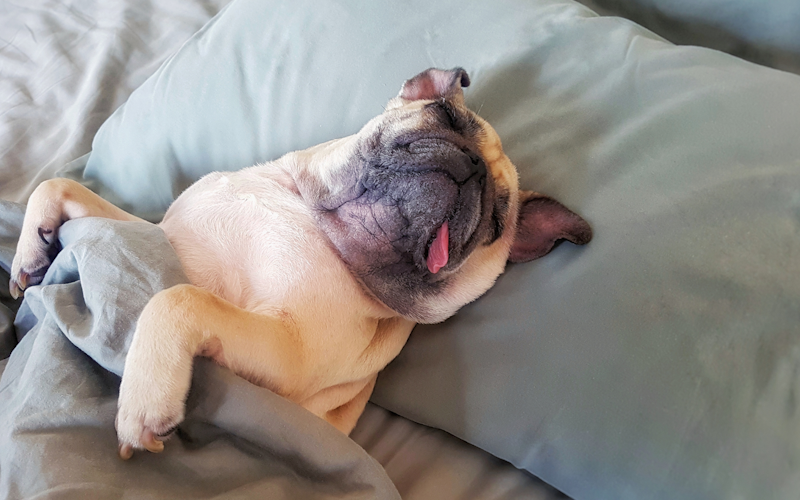Do you have a dog that snores louder than a freight train? If so, you are not alone. According to a survey by the American Pet Products Association, 45% of dog owners reported that their dogs snore regularly. While some may find it cute or funny, dog snoring can be a serious problem that affects both you and your furry friend. Not only can it disrupt your sleep quality, but it can also indicate underlying health issues for your dog.

Fortunately, there are ways to silence your dog’s snoring and help both of you get a restful night. In this article, we will explain the causes of dog snoring, offer various solutions, and provide additional tips and considerations. By following these steps, you can improve your dog’s well-being and enjoy a quieter sleep.
What Causes Dog Snoring?
Dog snoring is caused by the vibration of the soft tissues in the throat or nose when the airway is partially obstructed. There are many factors that can contribute to this obstruction, such as:
- Anatomy: Some breeds are more prone to snoring than others, especially those with short noses and flat faces, such as pugs, bulldogs, and boxers. These breeds have a condition called brachycephalic airway syndrome, which means they have narrow nostrils, elongated soft palates, and small tracheas that make breathing difficult.
- Allergies: Dogs can suffer from allergies to dust, pollen, mold, or other environmental irritants that can cause inflammation and swelling in the nasal passages or throat. This can reduce the airflow and cause snoring.
- Obesity: Overweight dogs have excess fat tissue around the neck and chest that can put pressure on the airway and make it harder to breathe. Obesity can also lead to other health problems, such as diabetes, heart disease, and arthritis, that can affect the quality of sleep.
- Sleep position: The way your dog sleeps can also affect its snoring. If your dog sleeps on its back, its tongue and soft palate can fall back and block the airway. If your dog sleeps with its head on a pillow or a high surface, its neck can be bent and restrict the airflow.
- Medications: Some medications, such as sedatives, antihistamines, or muscle relaxants, can relax the muscles in the throat and cause snoring. If your dog is taking any medications, consult your vet about the possible side effects and alternatives.

How to Silence Dog Snoring
Depending on the cause and severity of your dog’s snoring, there are different solutions you can try to quiet it down. Here are some of the most common and effective ones:
- Change the sleep position: You can try to adjust your dog’s sleep position by using a different bed, pillow, or blanket. For example, you can use a firm and flat bed that supports your dog’s spine and neck, or a wedge-shaped pillow that elevates your dog’s head and opens up the airway. You can also try to gently roll your dog over to its side or stomach, or encourage it to sleep curled up.
- Reduce allergens: You can reduce the exposure to allergens by keeping your dog’s sleeping area clean and dust-free. You can also use an air purifier, humidifier, or dehumidifier to improve the air quality and humidity. Additionally, you can wash your dog’s bedding regularly, vacuum the carpets and furniture, and avoid using scented products or candles that can irritate your dog’s nose.
- Manage weight: You can help your dog lose weight by feeding it a balanced and low-calorie diet, and by increasing its physical activity. You can consult your vet about the ideal weight and calorie intake for your dog, and follow a feeding schedule and portion control. You can also play with your dog, take it for walks, or enroll it in a doggy fitness program.
- Use anti-snoring products: There are some products that are designed to help reduce or prevent dog snoring, such as nasal strips, throat sprays, or snore stoppers. These products work by opening up the nasal passages, lubricating the throat, or stimulating the muscles in the airway. However, these products may not work for all dogs, and may have some side effects or risks. Therefore, you should always consult your vet before using any of these products, and follow the instructions carefully.

Additional Tips & Considerations
While these solutions can help you silence your dog’s snoring, there are some other things you should keep in mind:
- Consult your vet: If your dog’s snoring is loud, persistent, or accompanied by other symptoms, such as coughing, sneezing, wheezing, or difficulty breathing, you should take your dog to the vet as soon as possible. Your dog may have a more serious condition, such as a respiratory infection, a nasal tumor, or a sleep disorder, that requires medical attention.
- Consider surgery: In some cases, surgery may be the only option to treat your dog’s snoring, especially if it is caused by a structural problem, such as a deviated septum, a polyp, or a soft palate abnormality. Surgery can correct these issues and improve your dog’s breathing and snoring. However, surgery is not without risks and complications, and may not be suitable for all dogs. Therefore, you should discuss the pros and cons of surgery with your vet, and weigh the benefits and costs.
- Improve sleep hygiene: You can also improve your dog’s sleep quality and well-being by following some simple tips, such as:
- Providing a comfortable and quiet sleeping environment for your dog, away from noise, light, and distractions.
- Establishing a regular sleep schedule for your dog, and avoiding any changes or disruptions to its routine.
- Avoiding feeding your dog too close to bedtime, or giving it any caffeinated, alcoholic, or spicy foods or drinks that can affect its digestion or metabolism.
- Giving your dog enough exercise and mental stimulation during the day, but avoiding any strenuous or exciting activities before bedtime.
- Rewarding your dog for good sleeping behavior, and avoiding any punishment or negative reinforcement for snoring.
- Be patient and understanding: Finally, you should remember that your dog is not snoring on purpose, and that it may not be aware of its snoring or its impact on you. You should not scold, hit, or kick your dog for snoring, as this can cause stress, fear, or resentment. Instead, you should be patient and understanding, and try to find a solution that works for both of you. You can also use earplugs, headphones, or white noise machines to mask the snoring sound and help you sleep better.
Conclusion
Dog snoring can be a nuisance that affects both you and your dog’s sleep quality and health. However, by understanding the causes of dog snoring, and by trying the various solutions we have suggested, you can silence your dog’s snoring and enjoy a peaceful night. You can also improve your dog’s sleep hygiene and well-being, and consult your vet if you have any concerns or questions. By doing so, you can ensure that your dog is happy and healthy, and that you both get the rest you deserve.
